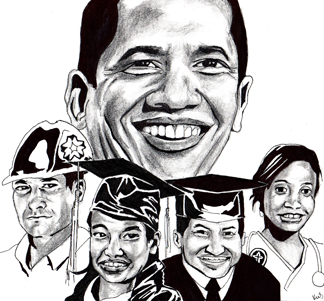By Jenna McLaughlin/reporter
Examples from African-American history were used Feb. 29 to encourage South Campus students to realize their own self-worth and value to society.The Rev. R.S. Emerson of Rising Star Baptist Church in Fort Worth began his presentation, iMatter, by describing a 9-year-old boy put on suicide watch by his school. Emerson described the boy as being an excellent student, active and raised in a traditional household with a spiritual upbringing.
The cultural and social environment the boy endured each day at school, however, made him feel inferior to his peers. Emerson said this situation is not uncommon and peers can be a factor in the way a person evaluates his or her life.
Emerson’s first example from history was Dred Scott, a slave from the South who petitioned for freedom. Scott lost his case but was the first African-American to have his appeal ruled on by the Supreme Court. The final ruling was based on a belief that slaves were property. Even the Constitution counted a slave as only three-fifths of a person.
Later, however, Scott was freed, and his case was instrumental in the eventual freeing of all slaves by President Abraham Lincoln, Emerson said. The point, he said, was that, despite the earlier ruling, Scott mattered greatly as an individual.
Emerson talked about what he called a copycat trend plaguing today’s society in which people try to imitate the celebrities they see on TV and in magazines.
“Know your identity,” he said. “We live in a generation where mankind has really become mediocre because we live up only to the level [of others] and not our own level,” he said. “Your identity is exquisite and essential to the destiny of this life.”
Emerson said a person’s identity is made up not only of backgrounds, bank accounts, college degrees or circumstances but of experiences that make up the whole.
He used Tyler Perry, Oprah Winfrey and Steve Jobs as examples. If each of these people had used his or her background to identify themselves, he said, none would have succeeded. Each person is not destined to live a fragmented life but a life with an individual purpose, he said.
Integrity is an important aspect of identity, Emerson said, adding that integrity makes a statement of identity no matter the circumstances and that it means standing by one’s own convictions. Integrity is to sacrifice acceptance for sanity.
Emerson recalled advice his mother had given him: “Don’t you ever grow up and spend money you don’t have on clothes that you can’t afford to go places that you don’t really want to go to impress people that you really don’t like.”
Influence should be a person’s greatest impact, Emerson said.
“We’re not called to simply exist. We’re called to live,” he said.
He encouraged people to have passion and purpose with all they do in life.
“Be the change you wish to see in the world,” he said, quoting Indian leader Mohandas Gandhi.
It does not matter if someone influences one person or a country, he said, since the influence on one could lead to influencing many.
Emerson ended by telling his audience that there will never be another person with the same gifts, talents, creativity, circumstances and energy as any one before them. He encouraged each person to hold on to his or her identity, integrity and influence.
In closing, Emerson asked audience members to point at themselves and say aloud, “I matter.”





























